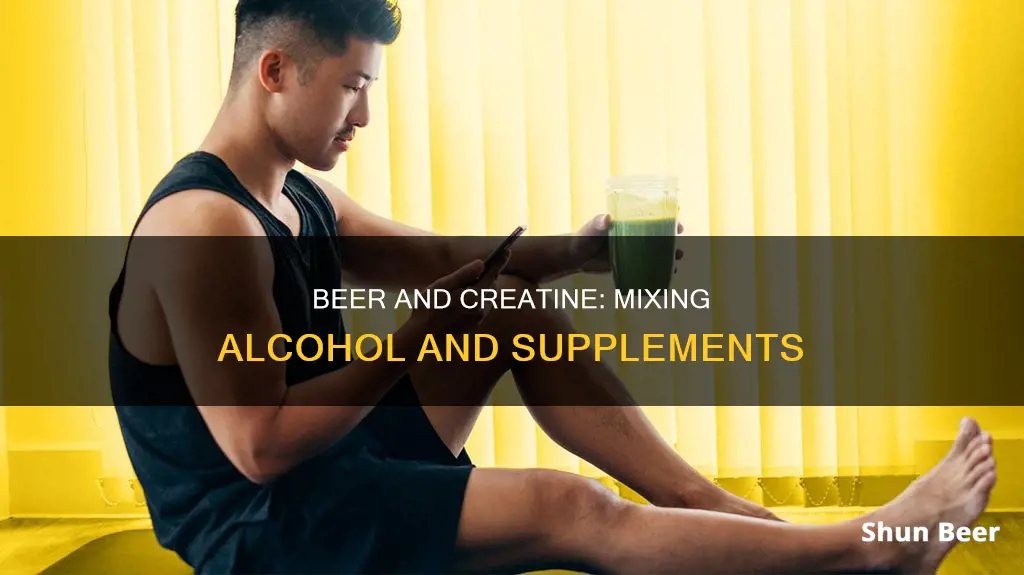
Mixing creatine and alcohol is generally considered safe in moderation, but excessive alcohol intake may negate the potential benefits of creatine for muscle growth and performance. Alcohol can impede the essential movement of nutrients and metabolism, which is crucial for fuelling the body during and after workouts. Creatine, on the other hand, is a compound that helps energise your muscles and hydrate your cells. While creatine supports healthy muscles, alcohol can work against it.
| Characteristics | Values |
|---|---|
| Effect on muscle growth | Alcohol inhibits protein synthesis in fast muscle fibres, causing a reduction in muscle mass. |
| Effect on muscle recovery | Alcohol slows down muscle repair and recovery. |
| Effect on hydration | Alcohol is a diuretic and can cause dehydration. |
| Effect on nutrient absorption | Alcohol slows the body's absorption of nutrients. |
| Effect on organ function | Alcohol impacts the liver and kidneys, which produce and use creatine. |
What You'll Learn

Alcohol and creatine have opposing effects on muscles
Creatine is an amino acid compound produced by the liver, kidneys, and pancreas. It helps muscles store more energy, leading to powerful bursts of energy and muscle growth. It also draws water into muscles, grows muscle fibres, and slows muscle breakdown.
Alcohol, however, can disrupt the body's absorption of essential nutrients, affecting muscle contraction and repair. It slows down the movement of calcium into muscles, causing muscle injury and slower recovery. Alcohol also pulls water from tissues, leading to dehydration, muscle cramping, and pain.
Additionally, alcohol affects the organs that produce creatine, including the liver and kidneys. Regular heavy drinking can damage these organs, reducing the body's ability to produce and utilise creatine effectively.
While creatine supports muscle growth and recovery, alcohol hinders these processes. Alcohol interferes with protein synthesis and the body's production of insulin and growth hormone, which are essential for muscle growth. Alcohol can also cause muscle breakdown by hindering the muscle rebuilding process.
In summary, alcohol and creatine have opposing effects on the body's muscles. Creatine supports muscle growth, recovery, and energy, while alcohol slows these processes down and increases the risk of injury. For optimal results, it is recommended to avoid drinking alcohol, especially on days when exercising, to allow the muscles to fully benefit from creatine supplementation.
Beer Towers: How Do They Work?
You may want to see also

Alcohol slows muscle recovery
Alcohol also slows the movement of calcium into muscles, affecting muscle contraction and coordination, and increasing the risk of injury. In addition, alcohol decreases the body's ability to absorb nutrients, including protein and amino acids, which are essential for muscle recovery.
Consuming alcohol after resistance exercise has been shown to increase cortisol levels and decrease testosterone levels, indicating a disturbance in the anabolic-catabolic balance, which leads to decreased recovery and performance. Alcohol also suppresses muscle protein synthesis, which is necessary for muscle repair and growth.
Overall, while the effects of alcohol on muscle recovery are complex and not yet fully understood, it is clear that alcohol consumption can impair the body's ability to recover from exercise and build muscle.
Drinking Beer After Donating Blood: What You Need to Know
You may want to see also

Alcohol may cause muscle breakdown
Secondly, alcohol increases protein degradation in skeletal muscles through two main pathways: the ubiquitin proteasome pathway (UPP) and the autophagic-lysosomal system. Alcohol can also cause oxidative stress, which further contributes to protein degradation and muscle breakdown.
Thirdly, alcohol affects the function of the mitochondria, which are essential for energy production in muscles. Alcohol consumption can lead to mitochondrial dysfunction, impairing the energy supply to muscles and potentially causing muscle breakdown.
Finally, alcohol can cause impaired muscle regeneration. Alcohol can delay skeletal muscle regeneration following injury, leading to prolonged recovery times and potentially contributing to muscle breakdown.
Ashland, Alabama: Beer Drinking Laws and Regulations
You may want to see also

Alcohol and creatine work against each other
Creatine is a compound that helps energise your muscles and hydrate your cells. It is an amino acid found mostly in skeletal muscles and is made in the liver, kidneys, and pancreas. It helps your muscles store more energy so you can use that energy in powerful bursts, which can lead to more muscle growth.
On the other hand, alcohol has the opposite effect on muscles. Drinking alcohol might undo some of the muscle-building benefits of creatine. Alcohol slows the movement of calcium into muscles, which affects muscle contraction and can lead to decreased coordination. It also slows down your body's ability to absorb nutrients, including protein and amino acids, which negatively affects how your muscles react to exercise and can lead to muscle injury and slower recovery.
Alcohol also takes water away from your tissues, acting as a diuretic and causing dehydration, muscle cramping, and pain. This can reduce the effectiveness of creatine, which needs water to help your body build and maintain muscle.
Additionally, regular heavy drinking can damage your muscles, liver, and kidneys—the same organs that make and use creatine. This can further reduce the benefits of creatine and negatively impact your overall health.
Therefore, it is important to drink in moderation if you are taking creatine supplements. It is also recommended to avoid drinking alcohol right after a workout, as this can interfere with the muscle-building process, and to stay properly hydrated to counteract the dehydrating effects of alcohol.
Beer Mile Basics: Drink, Run, Repeat
You may want to see also

Alcohol can heighten a hangover
Alcohol consumption can lead to dehydration, which is a significant contributor to hangover symptoms. Alcohol acts as a diuretic, increasing urination and fluid loss. This dehydration can cause thirst, fatigue, and headaches, which are common hangover symptoms. Additionally, dehydration caused by alcohol can disrupt electrolyte balance in the body, further exacerbating the hangover.
Alcohol also irritates the gastrointestinal tract, leading to nausea and stomach discomfort. It increases inflammation throughout the body, contributing to the overall sick feeling associated with hangovers. The toxic byproduct of alcohol metabolism, acetaldehyde, can cause a fast pulse, sweating, and nausea, and may also lead to organ inflammation.
Drinking alcohol can disrupt sleep patterns, causing fragmented sleep and early waking. This contributes to the fatigue and lost productivity often experienced during a hangover.
The negative effects of alcohol on the body are heightened when combined with creatine supplementation. Alcohol can slow down the absorption of nutrients, including protein and amino acids, which are essential for muscle recovery and growth. It also affects the organs that produce creatine, the liver and kidneys, impairing their function and reducing the efficacy of creatine absorption.
To minimize the risk of heightened hangover symptoms, it is important to drink in moderation, stay properly hydrated, and ensure adequate nutrient intake.
Beer and Tums: Safe Mix or Not?
You may want to see also







